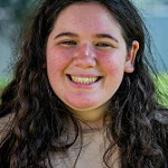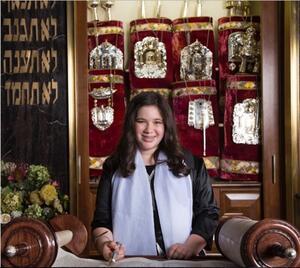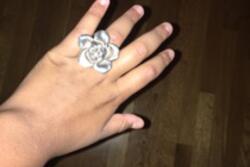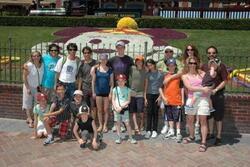My Big Fat Feminist Bat Mitzvah
Judaism and feminism have always been significant parts of my identity; I was born into them. From my father I inherited thick, curly hair and a nose that’s a little extra lumpy; and from my hometown, New York City, an appreciation for bagels with schmear, and for obnoxious Brooklyn accents littered with “schleps” and “oy veys.”
From my mother, I inherited an understanding of gender equality, the wage gap, sexual harassment, and knowledge about feminist leaders such as Gloria Steinem. Before I was truly acquainted with the word, I was a feminist. While I’ve always been unquestionably both Jewish and feminist, it never occurred to me that there was a place for feminism within Judaism, or that there needed to be.
I began questioning the concept of G-d at a young age. And, largely due to the outdated notion of G-d as the “old man in the sky” I was never explicitly taught but somehow was able to picture, I ignored the parts of Judaism I found dubious. Over time I developed my own version of G-d—who was inherently feminist— but this wasn’t a defining feature.
And so, throughout my elementary and middle school years, I dutifully attended Hebrew School, and I also read We Should All Be Feminists. I proudly fasted during Yom Kippur, competing with my Jewish friends about what age we started fasting, while truly understanding the importance of equal pay for equal work through my mother—the sole breadwinner for my family. The closest contact that Judaism and feminism ever had was when it was time for the silent prayer at Hebrew school, and I would pray to a construct of G-d that my dad would get a job because I knew a working man would make more money than a working woman.
When I was in seventh grade, and preparing for my bat mitzvah, I read a summary of my Torah portion, Vayeitzei, for the first time. In Vayeitzei, Jacob, one of Judaism’s forefathers, and Laban, father to two of our foremothers, Rachel and Leah, both grossly mistreat the women in their lives. In short, Laban forced his daughters to marry Jacob, in exchange for Jacob working for him for fourteen years. Initially Jacob was supposed to marry Rachel, but Laban tricked Jacob into marrying Leah first, thus forcing him to work longer before he could marry Rachel, his first choice. Once married, Leah is blessed by G-d with fertility, while Rachel is not. Rachel gives her maid, Bilhah, to Jacob for him to impregnate, and Leah does the same with her maid, Zilpah, in a strange competition.
When I read this summary I was appalled by how Rachel and Leah were regarded as no more than currency by their father. And, Bilhah and Zilpah, sometimes thought to be two half-sisters of Rachel and Leah, were forced into bearing Jacob’s children. I found the half-sister narrative, as it’s laid out in the Torah, reminiscent of fairytale villains—making Rachel and Leah seem like the evil ones.
While the text leads us to believe that Rachel and Leah simply “gave” their handmaidens to Jacob in an act of villainy, their actions were only products of their identity and place within an ancient patriarchal society as women. Their only value and currency were as wives and mothers, and they had almost no agency; thus, their actions in this story reflect that sad truth. It is the men in this story who are largely responsible for the gross mistreatment of women.
The very idea that I would have to proudly chant and accept this story, this version of Judaism that so obviously conflicted with my feminist sensibility, forced me to question my Jewish identity in a very real way, and for the first time. I was learning to chant Torah and Haftorah and the many prayers I would be leading while questioning the values of Judaism in an attempt to assess whether I wanted to become a Jewish adult. It was only through writing my d’var torah as a spoken word piece about this Grimm fairytale/nightmare sequence in our Torah, that I finally began to understand the complex relationship between Judaism and feminism in my own life.
While I didn’t suddenly become some sort of expert in the intersection of Judaism and feminism after my bat mitvah, recognizing that there was a relationship between two of the tenets of my identity was an important start. Since, I’ve tried to make a conscious effort to bring feminism into my Judaism, creating more depth in both my feminist and Jewish identities, mostly through questioning the validity of outdated Torah portions or simply becoming aware of the flawed nature of some parts of Judaism.
For the past three years, I’ve worked as a teaching assistant at my Hebrew School for fourth and fifth graders, where I’ve had the chance to guide students to become aware of the absence of feminism in Judaism and become aware of some of their own habits that reflect this absence, such as using male pronouns when referring to G-d. I’ve also realized the importance of using a feminist lens in the different aspects of my life, even if they don’t seem to explicitly have room for feminism. I’ve only begun to examine the intersection of Judaism and feminism and apply it to my own life, but feminism has already become rooted in my Jewish identity, and as I continue to practice Judaism, my understanding can only deepen further.
This piece was written as part of JWA’s Rising Voices Fellowship.








Hi Mirabel, thank you for writing such a beautiful essay and I'm so happy to hear about your Jewish journey!
I just wanted to comment on some of the Biblical sources that you quote. Firstly, according to Jewish tradition (and the Bible itself!), Rachel and Leah both loved Jacob and I would assume they would have been excited to marry him!
While we don't know a lot about Bilhah and Zilpah (the Torah was written at a time that unfortunately didn't consider a woman's voice important), I don't know why someone would assume that they were forced into marrying Jacob when the Torah doesn't make that claim.
I am so impressed with your journey of interpreting Torah through a feminist lens, we need more young women like you! However, I don't think there is a need to misapply cruelty to our foremothers and Jacob to achieve that!
I hope these comments will not be seen as discouraging as you continue learning about our beautiful (yet flawed) tradition. May I suggest that you take a look into "the original" (there are so many translations of the Torah online. Sefaria.org is a great start!) when presented with a Biblical story? (Maybe you even did that :))
Good luck!!
Awesome!!